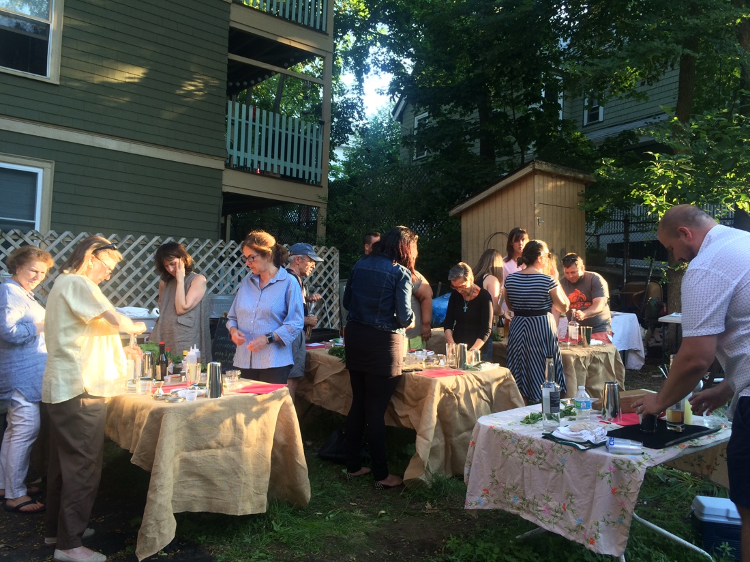Photo essay: The social and community resilience benefits of urban gardens | Upcoming live Q&A
The Trustees is actively involved in community gardens across the City of Boston, with 56 spread out across eight Boston neighborhoods. In addition to helping address food insecurity by providing an affordable source of produce, community gardens can help to build a city’s resilience in other important ways, many of which closely relate to the goals of the Trustees Boston Waterfront Initiative. Some of the resilience benefits of community gardens can include:
Absorbing heat
and providing a cooler area during hot summer days (combating what is known as the “urban heat island effect”). “Heat is a chronic hazard, a stress that the city faces every year…the entire city is at risk for the health impacts of extreme heat, especially those with health or other physical challenges, such as older adults or those with medical illness. The heat will increasingly stress the city’s energy supply and related infrastructure as people seek ways to cool down.” -Boston Climate Ready report
To learn more about The Trustees community gardens, click here
Absorbing rainwater
and helping to build resilience against flooding. Community gardens incorporate elements that can handle heavy rains and prevent flooding, protect against storm damage, and capture and store rainwater. “As neighborhood protectors, community gardens are models of community green infrastructure and climate change protection." -Aziz Dehkan, Executive Director of the New York City Community Garden Coalition, Gardeners’ Gathering 2019
ABOVE: Northampton Community Garden in the South End: Sounds of the Gardens concerts (2014), with Kaiti Jones- musician, accompanied by Two for the Show.
Contributing to the social resilience of a neighborhood
and strengthening community bonds. “Even if you can’t gather with fellow gardeners, you can still enjoy the sense of common purpose and community that you share with them.” -Michelle de Lima, Boston Community Gardens Engagement Manager.
ABOVE: A 2012 Seed, Sow and Grow workshop at Nightingale Community Garden in Dorchester-skill building with garden educator Erika Rumbley (center, gray hat and white bucket) and gardeners from Nightingale Community garden and Spencer Community Garden, located around the corner.
Contribute positive impacts of accessing locally grown food
including smaller carbon footprint. A UC Santa Barbara study modeled greenhouse gas emission reductions due to household vegetable gardens, and found that gardens had 2 kg lower emissions per kg of vegetable than purchased vegetables.
Above: Summer 2019 One Waterfront Ambassadors Julie T, Emily D, and Jessica Z helping to harvest produce in East Boston.
The Trustees’ 56 gardens translate to approximately 4,000 garden plots.
Using a conservative estimate of four people fed per plot, that works out to 16,000 people fed directly, with an additional estimated 5,000 people receiving donated produce from these gardens. It’s thanks to the 100+ volunteers that help run the gardens, and the estimated 17,000 people who participate annually in the programs, that these spaces are able to provide positive community impact and benefit.
Are you growing your own veggies or fruit this summer? Boston Community Gardens Engagement Manager Michelle de Lima is leading a live Q&A about vegetable garden care and maintenance on Wednesday, July 1 (click here for information or to RSVP). To stay updated on Community Gardens news and other upcoming live demos and webinars, follow the gardens on Facebook!





Editor’s note: Social distancing guidelines are posted at each Trustees Community Garden, and gatherings have been postponed. Gardeners are asked to maintain a safe physical distance, disinfect any shared tools and surfaces, and wear masks while in the garden. To learn more about the Trustees Community Gardens, email communitygardens@thetrustees.org.





